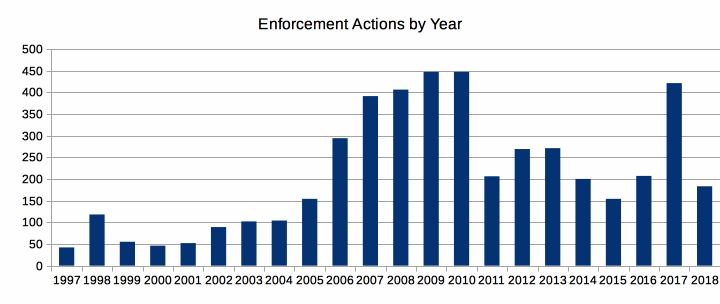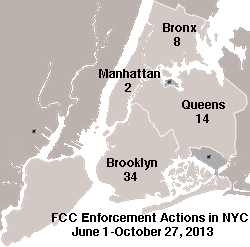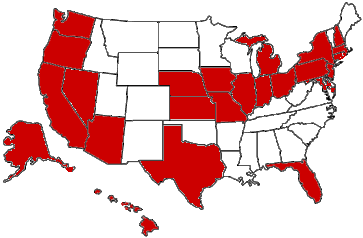Just updated the Enforcement Action Database and the signs are pretty clear: unlicensed broadcasting has slipped down the priority-list for FCC field agents. Actions against AM/FM and shortwave pirate stations last year were at their lowest level since 2005, the last time fewer than 200 were logged.

Tactically, even the agency’s penchant for paperwork seems to have slackened. Continue reading “FCC Steps Down Anti-Pirate Enforcement”
Tag: new york
NYC Pirates Need a Needle Exchange
Having lived here for a couple of years now, it’s true that New York City is a melting pot of culture like few other places. Sure, there’s Manhattan, from where the most nationally-recognizable symbols of the city’s culture emanate, but each borough’s got its own flavor, with distinctive neighborhoods and narratives.
This is very true for the radio dial. And of the five boroughs, nobody’s airwaves are more active than Brooklyn. Last year, I conducted a bandscan of receivable FM stations from my location on the Midwood/Flatbush border and picked up some 30 pirates; now it’s a new year and the FM dial remains alive with them. Somebody’s even established a Twitter feed that tracks (and samples) what’s on the air here. By and large, every frequency from 87.7 to 107.9 has something on it, and where I live there’s a one-in-three chance that it’s unlicensed. You can find everything from Afro-Carribean talk and music to Orthodox Jewish teachings and Hebrew music. There’s also stations devoted to the more mundane, like dance music, gospel, and death metal. Many are commercial, in mom-and-pop fashion. The languages are multivariate, but it’s all live and local, and despite its rough edges this FM dial is vibrant like nowhere else (save London, perhaps). Continue reading “NYC Pirates Need a Needle Exchange”
FCC Enforcement: On the Wane?
Just got the Enforcement Action Database caught up for the year, and the numbers show that FCC field activity is running at the lowest level it’s been since 2005. Just 173 enforcement actions to date, as opposed to ~260 at this time last year.
There was a similar dip in the years afer the FCC first proposed the creation of LPFM, and with LPFM’s second wave in the works it’s enticing to see a correlation, but this time around I’m more inclined to believe it has to do with changing political priorities regarding enforcement policy (pirates take a back seat to cell-phone jammers, for example) coupled with the effects of austerity on federal government services more broadly. Continue reading “FCC Enforcement: On the Wane?”
Industry Mulls Second FM-HD Power Increase
When HD Radio was under development and policy-discussions on the technology were in their infancy, proponents of the system bragged about all of the game-changing features it would have. This included audio quality that sounded better than CD and the ability to broadcast a plethora of digital data beyond audio itself.
They also told us that digital radio signals would be more robust and easier to receive than their analog counterparts. This was a critical assertion, because HD Radio works by shoehorning digital signals onto the existing AM and FM bands, right next to analog ones, and thus to avoid interference the HD signal can only be broadcast at just a fraction of a station’s analog power output. But proponents said that was okay: HD Radio only needed a fraction of the power to kick ass and blow minds. Continue reading “Industry Mulls Second FM-HD Power Increase”
Pirate Raids Offer Glimpse Into FCC Fieldwork
It’s been a busy month for FCC field agents and Federal Marshals in the Northeast. Last week they raided and seized the equipment of three unlicensed radio stations in the Boston area, while two weeks prior they took down four pirate stations in New York City.
The Boston raids netted a long-time pirate who operated way out in the open. TOUCH FM, founded by long-time and well-respected community activist Charles Clemons, had been on the air for eight years. Clemons was also quite engaged in the movement to expand low-power FM radio and even ran for mayor of Boston last year. He’s been on the FCC’s radar since 2007, when he was first visited and warned; the agency followed up with a $17,000 fine in 2008, which was never paid. Continue reading “Pirate Raids Offer Glimpse Into FCC Fieldwork”
FCC Anti-Pirate Efforts Focus on NYC
It was a pretty busy summer for the federales, who not only managed to roll out their own version of the Enforcement Action Database, but made moves against pirate radio broadcasters in nine states. Among them, New York saw the vast majority of this action.
 Of the 80+ recently-logged enforcement actions (which brings the yearly total to 200), nearly three-quarters of those happened in four of the five boroughs of New York City.
Of the 80+ recently-logged enforcement actions (which brings the yearly total to 200), nearly three-quarters of those happened in four of the five boroughs of New York City.
In the month of July alone, FCC agents visited and sent warning letters to more than two dozen pirates in the city; one unlucky station op in Queens got two visits and warning letters within this time span. Continue reading “FCC Anti-Pirate Efforts Focus on NYC”
Here Comes the Hammer: Pacifica to Lease Out WBAI
Uh-oh, indeed. Pacifica’s National Board is now soliciting bids to take over the programming and operations of its station in New York City. WBAI is prime real estate, transmitting with 4,300 watts of power from atop the Empire State Building on a choice frequency smack dab in the middle of the FM dial. The station’s worth tens of millions of dollars were it ever to be sold.
This was a long time coming. WBAI, like many of Pacifica’s radio stations, is caught in the jaws of a dilemma as old as community radio itself. Essentially, people can lose sight of the actual goal of running a successful and sustainable community radio station and instead use (and abuse) the station as a battlefield on which to act out some larger sociopolitical struggle. What the station stands for becomes more important than the station itself, and nobody wins. In Pacifica’s case, they stand to lose it all. Continue reading “Here Comes the Hammer: Pacifica to Lease Out WBAI”
Massachusetts Mulls Anti-Pirate Law
Lawmakers in Massachusetts are hard at work trying to outlaw unlicensed broadcasting. H.1679 was introduced in the state House of Representatives in January and got a hearing in the legislature’s Joint Committee on the Judiciary just last week. Floor votes are expected before the end of the year.
If approved, Massachusetts would become the fourth state in the country to pass an anti-pirate radio law. Continue reading “Massachusetts Mulls Anti-Pirate Law”
Pirate-Hunting: FCC Plods While Local Scenes Bubble
Halfway through 2013, and the FCC’s pace of unlicensed broadcast enforcement shows no real change from 2012: 106 enforcement actions in all, targeting more than three dozen stations, with the majority of this activity wholly administrative in nature. Pirate stations who appear on the FCC’s radar can now expect a warning letter to arrive via certified mail 1-6 weeks after an initial visit. Ignore those, and the agency may start asking for money.
 To date, the FCC has handed out $60,000 in Notices of Apparent Liability and $125,000 in actual forfeitures. However, not all of these penalties are new: in February, the FCC socked Whisler Fleurinor with a $25,000 fine for unlicensed operation in Fort Lauderdale, Florida. This is actually Fleurinor’s second go-round – he was first busted in 2010 and given a $20,000 forfeiture in 2011, which was later reduced to $500. It’s much the same story for Gary Feldman, who was first busted in 2004 for pirate broadcasting in Miami. He was caught again last year and fined $25,000 this year. Moreno’s 2004 forfeiture ($10,000) was never paid. Continue reading “Pirate-Hunting: FCC Plods While Local Scenes Bubble”
To date, the FCC has handed out $60,000 in Notices of Apparent Liability and $125,000 in actual forfeitures. However, not all of these penalties are new: in February, the FCC socked Whisler Fleurinor with a $25,000 fine for unlicensed operation in Fort Lauderdale, Florida. This is actually Fleurinor’s second go-round – he was first busted in 2010 and given a $20,000 forfeiture in 2011, which was later reduced to $500. It’s much the same story for Gary Feldman, who was first busted in 2004 for pirate broadcasting in Miami. He was caught again last year and fined $25,000 this year. Moreno’s 2004 forfeiture ($10,000) was never paid. Continue reading “Pirate-Hunting: FCC Plods While Local Scenes Bubble”
FCC Enforcement: Questionably Redundant and Retributive
Two-thirds of 2012 is in the can, and the FCC seems to be adhering to its “new normal” when it comes to pirate radio enforcement. Field agents have conducted 183 enforcement actions as of the end of August – this is up from the 132 actions logged by this time a year ago, but well off the year-over-year record-breaking enforcement pace set between 2006 and 2010.
The FCC’s been involved in anti-pirate enforcement activity in 15 states and Puerto Rico so far this year, as opposed to more than two dozen states by this point in 2011. The hottest spots continue to be the New York metropolitan area as well as the state of Florida more generally. Continue reading “FCC Enforcement: Questionably Redundant and Retributive”